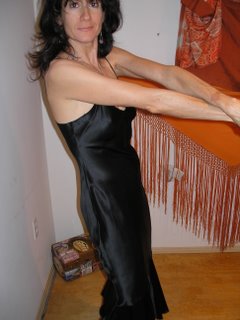Service
5/11/06
At the airport Hanah embarks on her "summer project": to thank community service members. There are a number of service men and women in the camo and she decides to write a note to one of them. He is slight, powerful, with regulation haircut, blue eyes and a sadness in his face. She approaches and hands him the card and his smile brightens, revealing white teeth. She thanks him for the work he does and we get to talking about, this his second tour in Iraq, the 2 families he was able to visit over his 15 day leave, what he truly feels about the States being there (we are neither successful or wanted). He will leave the service after this tour to go home and become a Kroger's Manager. He is a Seargeant with 25 men in his platoon and he feels responsible for them. He seems to want to share more and we let him know our opionion of the human waste we have laid over there. I want to hug him and tell him to stay, not go back, but he is locked in his wide-legged stance and I can see how torn he is between duty and his own convictions. We thank him again and he says he'll put Hanah's card up in his barracks. He looks like he might want to cry.
A group of similarly camo-clad female troops waits for their bags, one is on her cell phone and carries a Vuitton knock-off purse. The incongruity is palpable. These women have carefully coifed hair, unlike the men and I think of their curved bodies, that Nature designed to nurture, and here they are on a mission that may require destruction and murder. I am a feminist, but I just can't wrap my head around a woman strapping a semi-automatic rifle between her breasts and setting off to "protect and serve." How could my own daughter whose instincts are to pet every dog she sees, to stop eating steak because it takes a minute off your life, mama, for every bite and to do without electricity because it requires burning coal which causes pollution, be asked to kill to protect her rights as an idealist?
Where are the photos and the stories of the 4,000-5,000 of these men and women who have come home with torn bodies and ripped psyches? The seargent we met was able bodied and unwounded so far. If only our thank you cards were enough to ensure his, and all his colleagues' a safe return.
At the airport Hanah embarks on her "summer project": to thank community service members. There are a number of service men and women in the camo and she decides to write a note to one of them. He is slight, powerful, with regulation haircut, blue eyes and a sadness in his face. She approaches and hands him the card and his smile brightens, revealing white teeth. She thanks him for the work he does and we get to talking about, this his second tour in Iraq, the 2 families he was able to visit over his 15 day leave, what he truly feels about the States being there (we are neither successful or wanted). He will leave the service after this tour to go home and become a Kroger's Manager. He is a Seargeant with 25 men in his platoon and he feels responsible for them. He seems to want to share more and we let him know our opionion of the human waste we have laid over there. I want to hug him and tell him to stay, not go back, but he is locked in his wide-legged stance and I can see how torn he is between duty and his own convictions. We thank him again and he says he'll put Hanah's card up in his barracks. He looks like he might want to cry.
A group of similarly camo-clad female troops waits for their bags, one is on her cell phone and carries a Vuitton knock-off purse. The incongruity is palpable. These women have carefully coifed hair, unlike the men and I think of their curved bodies, that Nature designed to nurture, and here they are on a mission that may require destruction and murder. I am a feminist, but I just can't wrap my head around a woman strapping a semi-automatic rifle between her breasts and setting off to "protect and serve." How could my own daughter whose instincts are to pet every dog she sees, to stop eating steak because it takes a minute off your life, mama, for every bite and to do without electricity because it requires burning coal which causes pollution, be asked to kill to protect her rights as an idealist?
Where are the photos and the stories of the 4,000-5,000 of these men and women who have come home with torn bodies and ripped psyches? The seargent we met was able bodied and unwounded so far. If only our thank you cards were enough to ensure his, and all his colleagues' a safe return.


0 Comments:
Post a Comment
<< Home